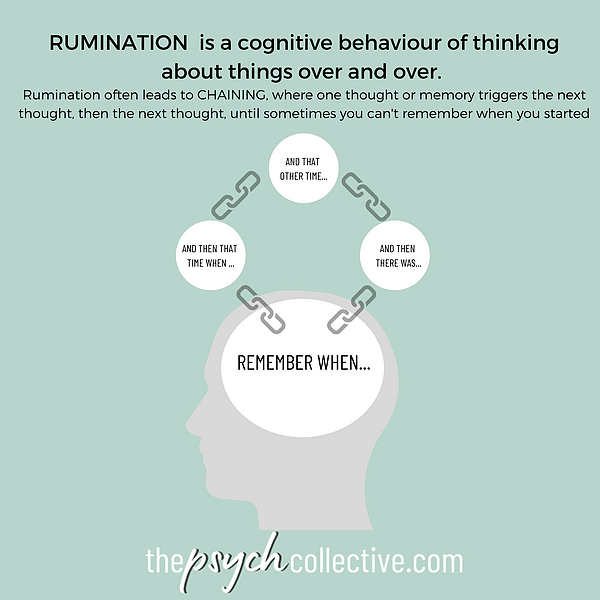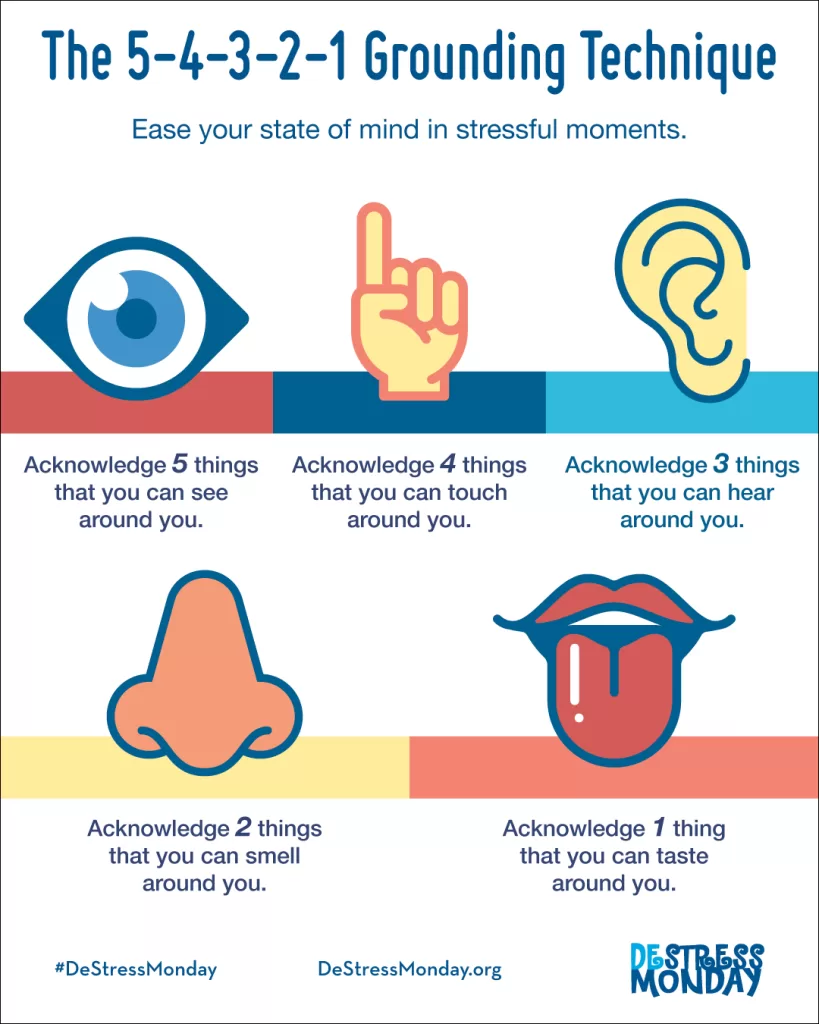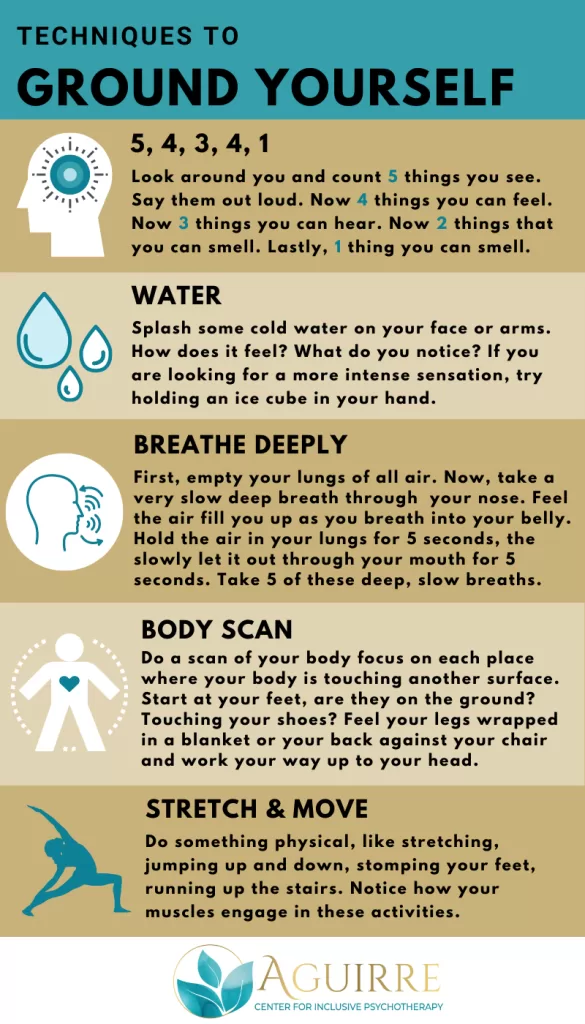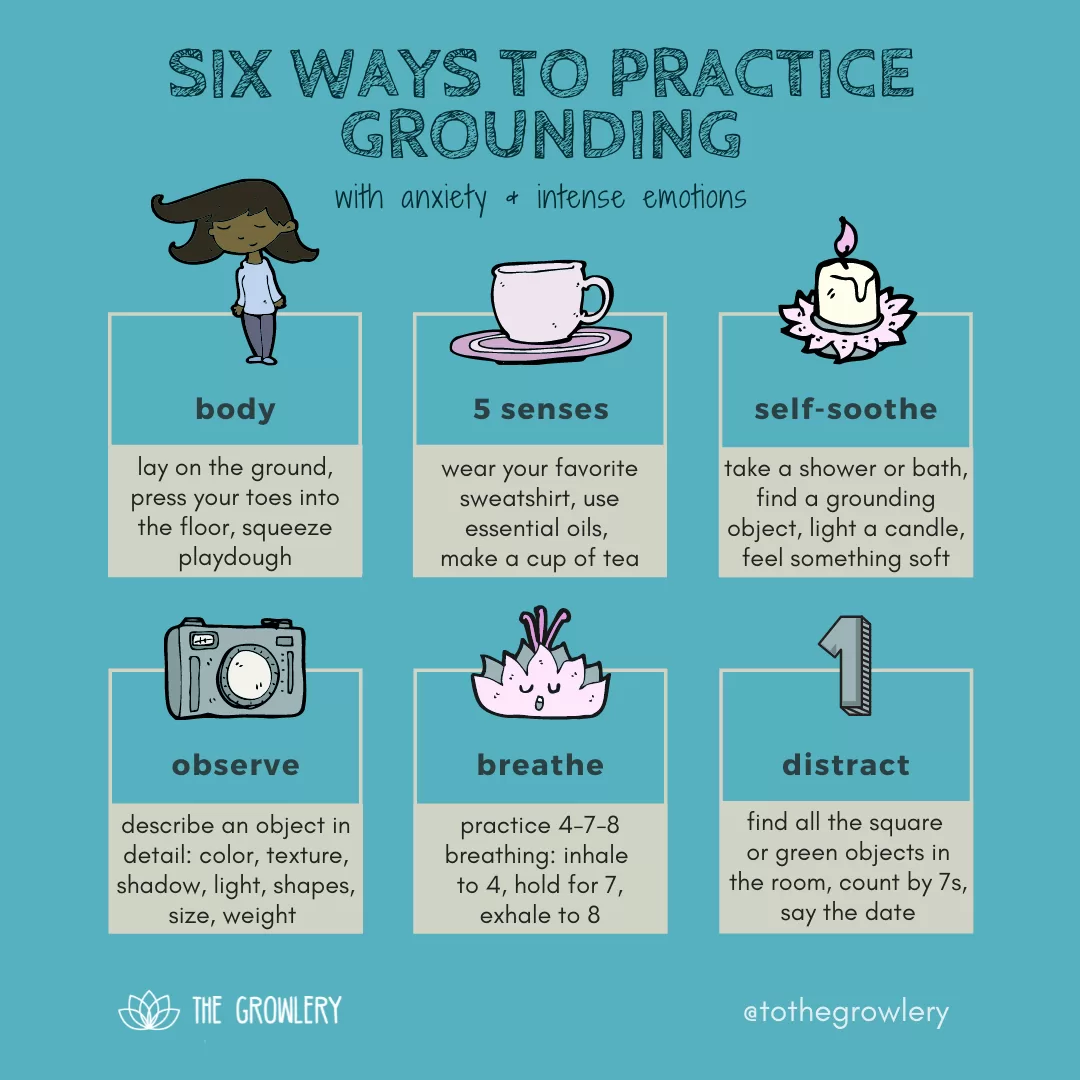You know when you can’t stop replaying something over and over in your head? That’s rumination.
According to the Merriam-Webster dictionary, it’s defined as an “obsessive or abnormal reflection on an idea or a decision.” Basically, it’s when your mind gets stuck on a loop, especially on negative experiences or emotions, and you can’t seem to break free.
Rumination is a cognitive process, and it’s often linked to various psychiatric disorders. It shows up in a few different ways:
- State Rumination: Obsessing over feelings of failure or distress.
- Action Rumination: Replaying mistakes and thinking about how to fix them.
- Task-Irrelevant Rumination: Random thoughts that have nothing to do with what you’re actually upset about.
- Post-Event Processing: Reliving social situations where you felt embarrassed or anxious.
There’s a great infographic from The Psych Collective that perfectly describes rumination.

Understanding Rumination After Narcissistic Abuse
If you’ve ever been in a toxic relationship, especially with a narcissist, you’ve probably experienced rumination. It’s incredibly common after narcissistic abuse, where their actions make zero sense.
It’s like our brains are desperate to understand the insanity of their behavior, but there’s no logical answer to find.
Narcissism is such a confusing personality type that even science hasn’t fully figured it out yet. So, we end up stuck, replaying everything, trying to make sense of something that’s basically senseless.
The most significant hindrance to healing from narcissistic abuse is rumination. Survivors often find themselves replaying the abuse in their minds, analyzing situations and questioning themselves.
Rumination presents one of the most substantial challenges in overcoming narcissistic abuse – even after leaving the abuser, these thoughts can haunt you for days or even years.
You relive every conversation and experience repeatedly, affecting your productivity. These thoughts can be distracting, taking your focus away, even when the narcissist is not present.
The voices in your head can keep you feeling small, and they seem to continue the work of the narcissist even in their absence.
Managing the anger and grief stemming from these thoughts can be incredibly challenging.
Examples of Rumination:
Imagine people have repeatedly told you that you’re not consistent, or not good enough.
Now, every time you’re about to embark on something new, this thought lingers in your mind: ‘Are they right? Am I wrong to believe in myself?’
It’s a relentless loop, even though deep down, you know that these individuals aren’t genuinely looking out for your well-being.
Think about the final episode of season 1 of the series ‘The Bear.’ It’s that moment when all those negative thoughts converge, typically when you’re stepping out of your comfort zone or standing on the brink of success.
There are also many flashback scenes in the series that depict rumination so well.
Even though you’ve made progress and achieved so much, deep down, you might still listen to those nagging voices.
I’ve personally found that watching those scenes repeatedly can be incredibly therapeutic.
Another common example of rumination is dwelling on the life you could have had if the narcissists were not in your life.
You find yourself fixating on all the missed opportunities and times when you downplayed yourself due to their influence.
It’s like a mental reel that plays out the ‘what-ifs’ and ‘could-have-beens,’ often leading to feelings of regret and self-doubt.
Recognizing the Signs of Rumination
Common signs and symptoms of rumination include:
- Overwhelming preoccupation with distressing thoughts and memories related to narcissistic abuse.
- Replaying past events and conversations in your mind, often in search of answers or validation.
- Heightened anxiety.
- Persistent sadness.
- Emotional exhaustion.
- Physical symptoms such as insomnia, loss of appetite, tiredness, and fluctuations in body weight.
- Difficulty maintaining focus.
- Reduced efficiency in work or study.
Why Breaking the Cycle of Rumination is Crucial
Breaking the cycle of rumination is super important for both mental health and overall well-being. Here’s why:
Mental Health Impact
- Increased Anxiety and Depression: Constantly dwelling on negative thoughts can seriously ramp up anxiety and depression, making it even harder to handle everyday stress.
- Impaired Problem-Solving: When you’re stuck in rumination, clear thinking and decision-making can feel impossible, leaving you feeling helpless and stuck.
Physical Health Consequences
- Stress Response: Constant rumination triggers your body’s stress response, causing headaches, fatigue, and even stomach issues. Over time, this can weaken your immune system.
- Sleep Disruption: Overthinking at night messes with your sleep, leading to insomnia or bad-quality sleep, which only makes mental health struggles worse.
Social Relationships
- Isolation: When you ruminate, you might pull back from social interactions, thinking no one will get it. This isolation just makes loneliness and depression worse.
- Conflict in Relationships: Constant negative thinking can create tension and misunderstandings with friends and family, straining those relationships.
Cognitive Functioning
- Reduced Focus and Concentration: Rumination is a big distraction. It makes it harder to focus on tasks at work or school, affecting your performance.
- Negative Thought Patterns: It reinforces a cycle of negative thoughts, making it tough to see things from a more balanced, positive perspective.
10 Ways to Break the Cycle of Rumination
1. Recognize that You Have a Rumination Problem
I struggled for a long time to figure out why I was becoming so inefficient in my studies. I couldn’t pinpoint where all my time was going.
During a period of peak narcissistic abuse, I couldn’t focus on anything because my mind was constantly preoccupied. I was always thinking about the narcissists, and their voices were constantly in my head.
The first step is realizing that you’re stuck in a cycle of rumination, wasting your energy on people who aren’t worth your time.
Self-awareness is where change starts.
2. Distract Yourself / Change the Scenario
When you feel that first negative thought creeping in, it’s crucial to take immediate action. Give yourself a quick 10-15 minute break.
The goal here is to stop those thoughts before they take hold. A simple change in your environment can work wonders. Step outside for a walk or switch rooms—whatever helps you shift your focus!
Here are some ideas to try during your break:
- Go for a walk.
- Do a quick 10-minute workout.
- Take a refreshing shower.
- Spend some time on skincare.
- Make a grocery list.
- Tackle some cleaning.
- Create a list of pending tasks.
- Enjoy quality time with your pet.
- Engage in some online window shopping (a personal favorite).
- Update your wishlist.
- Plan for a dream vacation in the future, even if money is tight.
3. Express Your Ruminating Thoughts
Don’t keep those thoughts bottled up! Share what you’re feeling in a safe space, whether it’s with your therapist or a close friend.
If that’s not an option, grab a journal and write everything down. Just let it out and get it off your chest!
Try to approach the particular incident or thought from multiple angles. Journaling can be a helpful tool for this, even though it may not be a pleasant experience.
Sometimes, delving deep into feelings can provide you with a new perspective.
4. Practice Self-compassion
If rumination is triggering feelings of shame and guilt, remember to forgive yourself.
You did the best you could with the knowledge and resources you had at that time.
Most of the negative opinions likely stem from the narcissist‘s perspective, not from someone with a healthy mindset. It’s often a projection of their own insecurities.
5. Focus on Moving Forward
Remember, your success and happiness are the ultimate revenge against narcissists. Instead of dwelling on the past, focus on building the future you want.
Seek out therapy, support groups, or safe spaces where you can heal and grow stronger.
Take control of your life by setting realistic, achievable goals. Put deadlines on them, and work step by step to make them happen.
You’ve already given too much time and energy to narcissists—now it’s time to invest that energy in yourself. Your future is entirely in your hands, so start moving forward today!
6. Get Creative
Whether it’s cooking, painting, writing, or making music, creating something new is a great way to shift your focus and feel productive.
I once read that real hobbies aren’t about consuming—they’re about creating. And it’s so true! Narcissistic abuse might have stripped away what’s authentic about you—your likes, feelings, and senses. Being creative is an awesome way to reconnect with yourself and rediscover who you really are.
When you dive into something creative, you can enter what’s called a “flow” state, where you get so absorbed in what you’re doing that everything else melts away. This kind of focus is linked to higher levels of joy and satisfaction, which helps lift your mood and reduce stress.
Whether you’re painting or journaling, expressing emotions through art can help release pent-up feelings, improve emotional balance, and ease stress.
On top of that, being creative stimulates your brain, boosts problem-solving skills, and sharpens your mind for day-to-day life.
So go ahead—try something new, get creative, and see how it changes the way you feel!
The following infographic from perfectly describes the benefits of being creative.

7. Be Mindful of What You Consume Online and Offline
Limit your time on social media and clean up your feed once in a while. If possible, block all narcissists and their enablers. Avoid anyone pushing toxic positivity too—it can be just as harmful.
Don’t waste your energy engaging with bullies, online or offline. It’s simply not worth it.
Constantly reading tragic news can make you feel even more vulnerable, especially after experiencing narcissistic abuse. Staying informed is good, but try not to dive too deep. A quick skim of the headlines should keep you in the loop without overwhelming you.
On a brighter note, watching movies, shows, or listening to music that focuses on overcoming abuse or revenge has helped me a lot. It gives me a sense of satisfaction and empowerment.
For example, Taylor Swift‘s “Look What You Made Me Do” is a favorite of mine for shifting my mindset from victim to survivor. I also rewatch “Promising Young Woman” quite often.
8. Practice Radical Acceptance
No matter how many times you think about what could have been, the truth is there was nothing you could’ve done differently.
Narcissists have their own twisted way of seeing you and life in general, and it’s not your job to fix that. So don’t give their thoughts, voices, or memories any space in your mind—they’re all lies.
Narcissists aren’t on your side, and they never will be. They lie, manipulate, and are never going to change—no matter how much time passes or how long you stay no-contact. They were abusive, and you did the best you could with what you knew at the time.
Would you remember what a mentally challenged person screams at you on the street or what a catcaller yells? Probably not, because their words don’t hold any real meaning or value in your life.
That’s exactly how you should treat narcissists. Their words and actions are just noise—don’t give them any space in your mind.
9. Try Meditation or Deep Breathing
When your mind’s stuck in a loop of negative thoughts, meditation can be a lifesaver. The goal of meditation is to clear your mind, which can be super helpful for breaking the cycle of rumination.
Meditation and deep breathing techniques, particularly breathwork meditation, offer a wide range of mental and physical health benefits.
Mindful breathing exercises help manage anxiety by activating the parasympathetic nervous system, promoting a state of calmness. Techniques like 4-7-8 breathing have been shown to reduce anxiety symptoms effectively
There are plenty of breathing techniques out there that can help relieve stress, so explore what works best for you!
Practical Techniques
- 4-7-8 Breathing: Inhale for 4 seconds, hold for 7 seconds, exhale for 8 seconds. This technique promotes relaxation and can be practiced multiple times a day.
- Diaphragmatic Breathing: Focus on deep belly breaths rather than shallow chest breaths to maximize oxygen intake and promote calmness.
- Mindful Breathing: Simply observe your breath without trying to change it; this practice enhances awareness and fosters a sense of peace.
10. Practice Grounding Techniques
When you find yourself ruminating, redirect your attention to your immediate surroundings. Notice colors, sounds, and sensations, which can help anchor you in the present moment. Awareness of the present environment not only helps in breaking the cycle of negative thinking but also promotes healthier coping mechanisms in response to stressors.
Types of Grounding Techniques
1. Mental Grounding Techniques
These techniques focus on cognitive strategies to divert attention from distressing thoughts:
- 5-4-3-2-1 Technique: Identify and list:
- 5 things you can see
- 4 things you can touch
- 3 things you can hear
- 2 things you can smell
- 1 thing you can taste
The following infographic from perfectly describes the 5-4-3-2-1 Grounding Technique.

- Counting or Spelling: Count backward from 100 by sevens or spell your name backward to engage your mind in a focused task.
2. Physical Grounding Techniques
These methods involve engaging with your physical environment:
- Press Your Feet into the Ground: Stand or sit comfortably and feel the ground beneath your feet. Press down firmly to create a sense of connection.
- Use Water: Place your hands in warm or cold water and focus on the sensations. Notice the temperature differences and how they feel on your skin.
- Tense and Release Muscles: Clench your fists or other muscles tightly for a few seconds, then release to feel the difference between tension and relaxation.
3. Soothing Grounding Techniques
These techniques promote calmness through positive imagery and sensations:
- Visualization: Imagine a safe place or a comforting scenario to help induce relaxation. This could include visualizing turning down an emotional dial or picturing a serene landscape.
- Savor Pleasant Scents: Use essential oils or scented items that bring comfort, such as lavender or freshly baked cookies, to engage your sense of smell.
The following infographics from and The Growlery perfectly describes some Grounding Techniques.


Final Thoughts on Breaking the Cycle of Rumination
Breaking free from rumination after narcissistic abuse is tough, but with the right tools, it’s absolutely achievable. Whether it’s through meditation, creative outlets, or setting future goals, these strategies will help you regain control over your thoughts and emotions.
Be patient with yourself—healing isn’t linear, and it takes time. Surround yourself with supportive people, practice self-care, and stay committed to moving forward. You deserve peace, and it all begins with breaking the cycle of rumination.
FAQs on Rumination
Does narcissistic abuse cause rumination?
Yes, people often ruminate both during narcissistic abuse and even after the relationship has ended. The trauma from these relationships creates a mental space where obsessive thinking becomes hard to escape.
How do I stop obsessing after narcissistic abuse?
There are many tools to help stop the obsession, including mindfulness techniques, creative outlets, setting goals, seeking support, and therapy.
What triggers rumination?
Rumination can be triggered by personal vulnerabilities, traumatic experiences, specific stressors, and underlying mental health conditions.
References:
https://www.healthline.com/health/how-to-stop-ruminating#faq
https://www.psychiatry.org/news-room/apa-blogs/rumination-a-cycle-of-negative-thinking
https://www.ncbi.nlm.nih.gov/pmc/articles/PMC3312901/
https://www.fiphysician.com/rumination-and-narcissistic-abuse/

